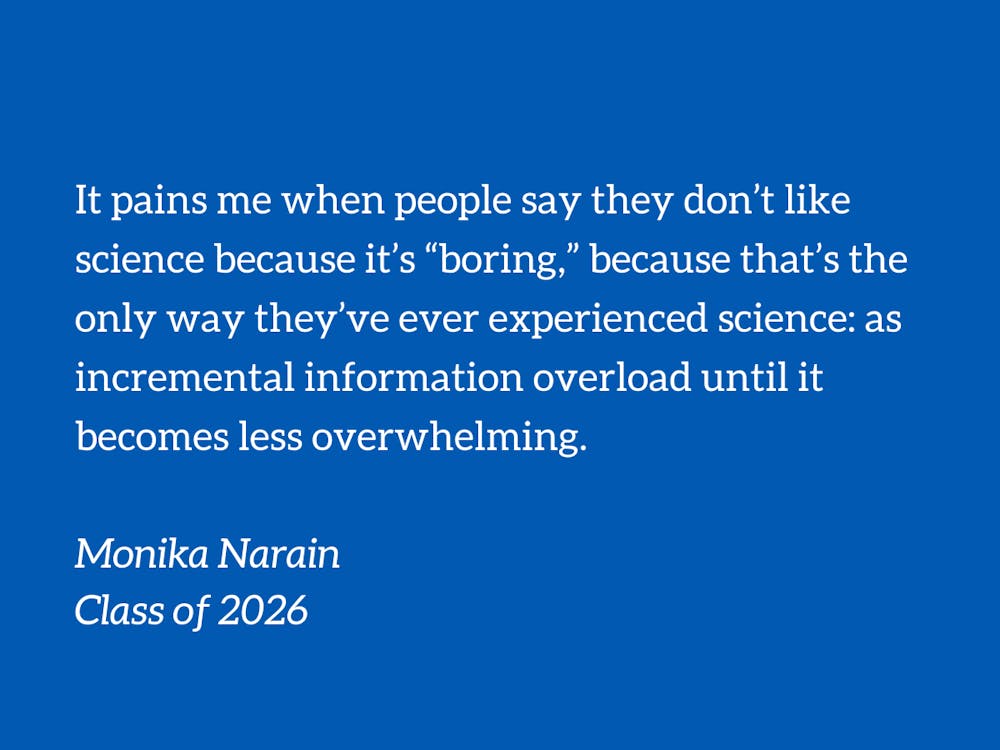I believe our relationship to science education is overwhelmingly transactional. We sit in a chair, have information presented, imprint it in the old noggin and then are tested on how well we’ve remembered said information. It’s like a file transfer, only most of the files kinda get corrupted or I accidentally drop the USB stick into a puddle of soup. While this form of instruction is not limited to the sciences, it’s most common for teaching big, foundational subjects like calculus, computer science or inorganic chemistry.
This is not to assign a value judgment to this form of teaching, because it is extremely direct in telling students what they should get out of a particular course, and has historically prepared students for careers in the sciences and a whole variety of other disciplines. But it pains me when people say they don’t like science because it’s “boring,” because that’s the only way they’ve ever experienced science: as incremental information overload until it becomes less overwhelming. We only turn to science when we’re trying to retain information for a transactional purpose (e.g. a high-paying job or graduation requirements). But is science only meant for informing? And is informing the only way of academic learning?
When I think of reasons people turn away from science, or even more serious matters like our nation’s growing Anti-Science movement, one of the core issues boils is human emotion. Education is a service, but it’s also an experience. If that experience is boring, cold or even hostile, why would we engage with it? Not only can the experience of science education be, at the very least, unentertaining for some, but scientific information itself forces a lot of uncomfortable emotions people don’t want. It’s the same reason a lot of people don’t like learning about things like inequality studies or most of American history.
When you learn about the pathology of various infectious diseases, their susceptibility and their lethality, you can’t help but feel anxious. When you learn all the doomsday climate change statistics threatening a point of no return for our planet, you can’t help but feel hopeless. When you learn about the endlessness and expansiveness of the universe, and how small and significant the human race is in comparison, you can’t help but feel pretty freaking useless. It’s like the rock scene in "Everything, Everywhere, All At Once:" “Who knows what great discovery is coming next to make us feel like even smaller pieces of shit?”
But is that science’s fault that we feel that way? After all, science is also the source of so much joy, wonder and curiosity for so many people. When you learn about different animal and plant species, you can’t help but feel a new form of connection with beings that aren’t as different from humans as you think. When you learn about human psychology or neuroscience, you can’t help but develop a better awareness of your own behavior, translating into better self-care practices. When you learn about geology, you can’t help but be like, "Shoot man, rocks are actually pretty cool!" And even the emotional discomfort from subjects like pathology or environmental science can be transformed into hope and enthusiasm given the right resources and mentorship.
I think when I was younger I liked science because learning it made me feel smart, which then made me feel superior to my peers. I liked the clout; what fifth-grader doesn’t? But I now believe that I like science because I fundamentally enjoy feeling the wonder and awe; I even like feeling the confusion. I like that science in my life is no longer like a file transfer, but a whole new software; not just a reservoir of facts, but an entire framework that has enabled me to navigate the world with a deeper sense of compassion and curiosity. And I hope we can better integrate wonder and curiosity in our science curriculum, in addition to the skill-building, computation and assessment-preparedness components. I hope we can slightly shift the focus from innovation and invention to appreciating what’s already within our natural world.
Science is for traditional learning, for innovation, for policy and life-saving products. But it’s also for fun, for pleasure, for self-growth and establishing a deeper connection with the world around us. I hope we can better normalize that.
Monika Narain is a Trinity junior. Her column typically runs on alternating Thursdays.
Get The Chronicle straight to your inbox
Signup for our weekly newsletter. Cancel at any time.

